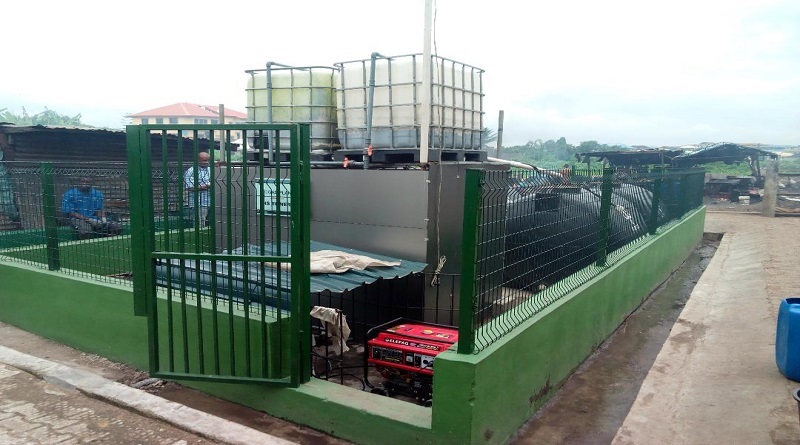FOTE, IHS deliver Ikorodu biogas plant
Photo Caption: The biogas plant at Ikorodu Mini Abattior.
One of the foremost environmental non-governmental organization in Nigeria (FOTE),in partnership with IHS Biogas have delivered a biogas plant that convert organic waste- cow manure and rumen content- to biogas and a by-product of rich organic fertilizer.
Essentially, the aim of the project was to design, build, supply and maintain a biogas plant which will be capable of converting organic waste through the installation of four 5,000 litre digester tanks and fed with digestible organic waste and concentrated waste water from the abattoir.
The biogas, produced from the plant is currently being use to power the Ikorodu Mini Abattior, at Ebute road, Ikorodu, Lagos State for close six hours every day. The project, which commenced September last year was completed and commissioned late July this year.
Since the completion of the project, the animal waste which was hitherto a challenge and burden to dispose to the abattoir has been channeled to the plant which now supply electricity and pumping water to the facility.
Not only that, the organic fertilizer produced from the plant is now been sought after by farmers to nourish their vegetable and other planted crops in their farm.
Elated representative of Bolfas Agro Allied limited, the concessionaire of the Ikorodu Mini Abattior, Prince Osindeinde Adebiyi, who spoke on the impact of the biogas plant during a visit to the facility recently, disclosed that between 35 to 45 cows are slaughtered at the abattoir everyday and the waste channeled to the plant to produce gas to generate light and boil water for use in the abattior.
He explained that power produced through the gas generated power the abattoir for close to six hours every day while the public supply is used for the remaining part of the day.
Adebiyi added that the conversion of the animal waste to biogas as helped to eliminate odour that is usually synonymous to any abattoir and regular supply of water to the facility, “No more odour in the environment, you cannot perceive any odour”, he insisted.
He commended FOTE and her partner for their efforts in delivering the plant and ensuring that it functions well even after completion.
Representative of TOGATA Renewable Technology, the designer of the facility and Project Manager, Aniche Phil-Ebosie, an engineer, disclosed that the technology was derived from Germany but was a bit expensive which prompted the organization to look inward and came with idea of using pvc water tank which can last for decades.
He explained that 90 per cent of the materials used for the plant were sourced locally which made it cost effective and environment friendly. He added that the bigger the abattoir and number of cows killed per day, the better it will be to get organic waste.
Asked on the sustainability of the plant, the project engineer said it can last as long as the PVC water tank can last.
Phil-Ebosie explained that apart from saving money from buying fuel, the plant also produces organic fertilizer as a by-product.
“Your waste need not be a burden, it can be converted to biogas and other form of value”, Phil-Ebosie advised.
Chairperson, FOTE, Mrs. Olu Maduka, an engineer, said the organization looked at the rate of power generation and what they spend on fuelling the abattoir and considered alternative that would cheaper.
“It is pilot project which can be replicated in larger scale across the country where people that have abattoir can supply the waste and get gas for electricity. It is a clean energy that will also help the energy challenge”, FOTE chief said.
Mrs. Maduka said FOTE is an NGO with a focus on women empowerment and sustainable energy that has carried out projects in the cook stove, LPG and construction of biogas plant in selected areas, adding that the essence of this is to conserve the environment and mitigate climate change and desertification.




